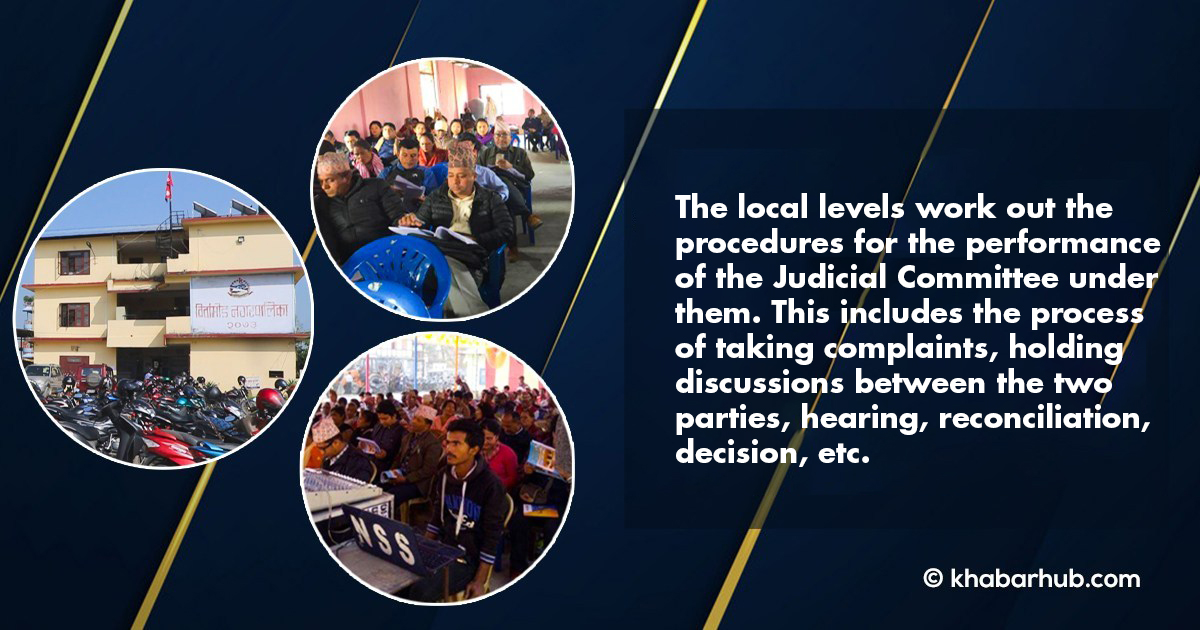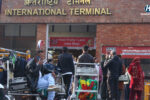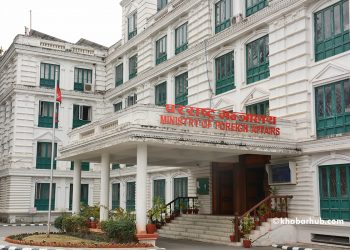JHAPA: Sharmila (name changed) of Birtamod filed a complaint at the Judicial Committee of Birtamod Municipality over the phone saying that her husband did not care for her while she was pregnant.
She repeatedly complained at the committee saying her husband, a driver by profession, neither returned home during the lockdown and did he arrange food for her even during her pregnancy.
All official works of Birtamod Municipality were stalled due to the lockdown enforced to curb and control coronavirus pandemic then.
The representatives of the Judicial Committee advised her to file a petition at the police office as the office was open even during the lockdown.
However, Sharmila told the Committee that she did not feel comfortable going to the police.
“The case was sensitive; we could not get involved physically. We contacted the local social workers via telephone and the case was resolved over the phone,” Tika Lamichhane, an officer at the Judicial Committee shared delightfully, “Now, she is receiving good care; the family is doing well.”
Piles of complaint over the phone
The purpose of establishing the Judicial Committee is to ensure victims’ access to justice.
Although there are other authorities like police and the court to help people get justice, the process itself is full of hurdles; hence the victims do not get justice easily.
It involves both time and money. Besides, the victims are reluctant to talk openly with strangers. Thus, justice for the destitute and poor was a far cry.
The victims have easy access to the local level Judicial Committees. Most of the people in the ward office are acquaintances.
Everyone has someone known in such offices. Even if they are not much known, the victims feel more comfortable with society, which makes it easier for them to share their problems.
Placing more emphasis on reconciliation of the issue in a win-win situation, the Judicial Committee has been satisfying both parties in most of the cases.
Even during the lockdown enforced to curb and control the coronavirus pandemic, there has been a big pile of complaints at the Birtamod Municipality and most of them have come over the phone.
Tika Lamichhane, an official at the Judicial Committee in Birtamod says most of the complaints that it received are about husband and wife.
“The husband and wife who used to be busy in work of their own got the free time due to lockdown and happened to be together. They got a chance to see each other’s message and phone and got further suspicious about each other,” Lammichhane told Khabarhub, “This resulted in a misunderstanding between husband and wife. We settled many cases over the phone though we do not have the record of the cases settled via phone.”
Performance according to the situation
The local levels work out the procedures for the performance of the Judicial Committee under them. This includes the process of taking complaints, holding discussions between the two parties, hearing, reconciliation, decision, etc. Attempts are made to reconcile both sides.
Official works were not possible during the lockdown. It was not possible to call both sides to the committee for a discussion when the movement of the people was curtailed and social distance had to be maintained as well.
However, the Judicial Committee of Birtamod Municipality made its work effective even during the lockdown period.
Pabitra Mahatara Prasai, the Deputy Mayor and Coordinator of Judicial Committee of Birtamod Municipality are satisfied to find that they were able to work as per the situation.
“Although we were confused on how to work in the beginning, as the cases especially the cases of domestic conflict and violence did not stop even during the lockdown, we found the way out,” Prasai told Khabarhub, “We used technology, we started reconciling the cases over the phone.”
She shared her experience that the committee has been winning the trust of the public lately. “People have realized that one should seek justice instead of enduring injustice,” she said.
She informed that the committee received more than 15 cases over the phone during the lockdown period and more than 50% of them got settled over the phone.
The poor and destitute feel their access to justice increased
There is the general belief that justice in Nepal is in the hand of those with access to power. People feel that the sweat and toils for justice are far more painful and full of suffering than withstanding justice.
The police and court are beyond the access of the poor, the way to them is full of procedural hurdles, the cost of hiring legal assistants and raising funds for all these activities are beyond the reach of the poor and helpless.
Not only this, the cases do not get settled for years. The poor and destitute are forced to endure pain instead of justice as they cannot afford the time and money needed for it, which ultimately makes the law and the authority favor the rich.
With the establishment of Judicial Committees at the local level, out-of-reach citizens have also started knocking on the door of justice.
There is the provision of establishing a reconciliation committee in the ward office. This has made it easier for the deprived and marginalized people to complain and seek justice claiming they are wronged.
Besides, fact that the people in the judicial committee and ward offices are the people’s representatives, mostly victims also find it convenient to speak to such people.
The people’s representatives understand the pain and suffering of the helpless victims of the villages much easily. Thus, the judicial committee and reconciliation committee has made justice accessible to the people who could not reach to police administration and the court otherwise.
“The access to justice has increased now, there is Tol Development Committee in each Tol and each such Tol (a small locality with few houses) people have got a place to get there disputes resolved next door,” Deputy Mayor Prasai told adding, “Besides there is reconciliation committee in each ward to resolve the conflicts and misunderstandings resolved at the local level.”
She further said that only the disputes that are not resolved in ward offices reach the Judicial Committee.
“If the conflict is not resolved yet, then both parties are called to the office for discussion and the decision gets resolved at last,” Prasai told ahead.
The Judicial Committees formed under the coordination of the Deputy Mayor have been instrumental in resolving disputes in Jhapa and, hence are regarded very effective in enhancing access to justice.
Even big disputes are also resolved tactfully by the Committee. Impressed by the role of the committee and the role played by the locally elected representatives, the number of people visiting the Judicial Committee has also increased remarkably.
The Judicial Committee of Birtamod Municipality received as many as 166 cases in the fiscal year 2018/19. Out of them, 133 ended in reconciliation and seven had to be formally decided by the bench there.
Likewise, three cases were adjourned and 23 unresolved cases were transferred to the fiscal year 2019/20.
According to Deputy Mayor Prasai, out of 66 cases registered in the committee in the running fiscal year, 44 have ended in reconciliation. Others are going through the procedures.
According to Tika Lamichhane, an employee of the Birtamod Judicial Committee, the issues like land disputes, the quarrel between husband and wife, and the conflicts between the neighbors or villagers come to the Judicial Committee for resolution.
“We settle the cases that can be reconciled here, but if the issues do not come under our jurisdictions, we inform the procedure and inform them the procedure they have to go through,” she told Khabarhub, “Sometimes the cases related with transactions come to us; as we do not have the right to handle them, we suggest them the measures they have to take ahead.”
Access to justice for the indigenous
Jhapa has a large population of tribals including Rajbanshi, Tajpuriya, Santha, and Musahar. These communities still abide by the chieftaincy system. The Santhals call their chief Majhihadam.
Be it an ordinary or a complicated issue of dispute, the disputes are resolved at Majhihadam.
Deprived of access to education for various reasons, the Santhal community does not reach the courts even when there is a big incident.
Such communities’ attitudes towards women and the ways of administration of justice are also traditional. Women and low-income people in such a society are also adversely affected by some incidents of violence.
With the coming into operation of the Judicial Committee, the people of the indigenous community have also started knocking on the door of the committee for justice.
Gita Bhetwal, the Deputy Mayor of Gauradaha Municipality and Coordinator of the judicial committee in the village, tells that the indigenous community of Gauradaha Municipality has started coming to the judicial committee seeking justice.
While speaking to Khabarhub, she shared that some cases of the indigenous community came to the Judicial Committee even during the lockdown.
“They (the people of the indigenous community) did not use to go to court seeking justice even when they had big disputes or issues, now they have started coming to the judicial community,” Deputy Mayor Bhetwal told, “Now they come to the committee even over minor disputes.”
She also feels that the pandemic has affected the pressure of the committee.
“The pandemic troubled us as well, yet, we are handling the cases every day,” Bhetwal shared with Khabarhub, “We conduct discussion in the group of five members.” She added that the number includes both parties.
The committee has also been carrying its service over the phone.
Various tribal areas still follow the traditional structures of administration of justice even today. Not all of them are bad. Like the modern judicial committees, some of such structures act as conciliators. Many of the laws and norms of these structures are traditional.
Judicial committees at the local level have been instrumental to bring the victims of such communities into the official judicial system for administration of justice as patriarchal, and socially discriminatory beliefs are still ingrained in traditional structures. The judicial committee needs to make more efforts for this purpose.
The judicial committee needs to make further efforts in this regard.
The small cases are decreasing in court
The Judicial Committee formed at the local levels has not only looked into small disputes and cases in the village but has also been giving necessary advice and assistance in cases reaching the courts.
Former Vice President of Nepal Bar Association Advocate Ashok Pokharel has noticed that the number of small cases coming to court has decreased remarkably after the formation of Judicial Committees at the local level.
“After the formation of the Judicial Committee, the committee has started settling most of the cases that can be resolved locally through the committee, hence the small case pressure has decreased in the court,” Pokharel told Khabarhub, “This has helped in the administration of justice.”
Advocate Pokharel feels that the lockdown enforced to curb and control the coronavirus pandemic made it further difficult for the poor and helpless to get justice.
The long-distance one has to cover to reach the court and the restriction on the movement of vehicles made people’s journey to the court very difficult.
“The police offices are located in certain places. When the conflicting parties do not reach an agreement in the facilitation of the police, the police sends the case to the court,” advocate Pokhrel told Khabarhub, “The journey to court is not easy for various reasons like the distance to court, the dependency on the public vehicles, the high-cost one has to spend for fulfilling the procedure all are discouraging for the poor.”
In such a situation, the judicial committee has turned accessible both because they are accessible in terms of distance and are cost-efficient as well. What’s more, the poor and the helpless get justice at their convenient places.
Having a reconciliation center or judicial committee nearby home, having acquaintances or people who understand the society has made it easier for the victims to seek justice. The victims’ confidence has also increased.
Yet, the judicial committees are not without problems. Sometimes the complaints against the committee that it has taken to political discrimination and privilege to the people in power smear the image of the committees. There is also the need for further capacity enhancing training for the officials and personnel at the committee. Above it all, the committee often feels the scarcity of resources.
Despite these weaknesses, the Judicial Committees are becoming a center of trust and hope for justice for the poor and otherwise helpless people.









Comment